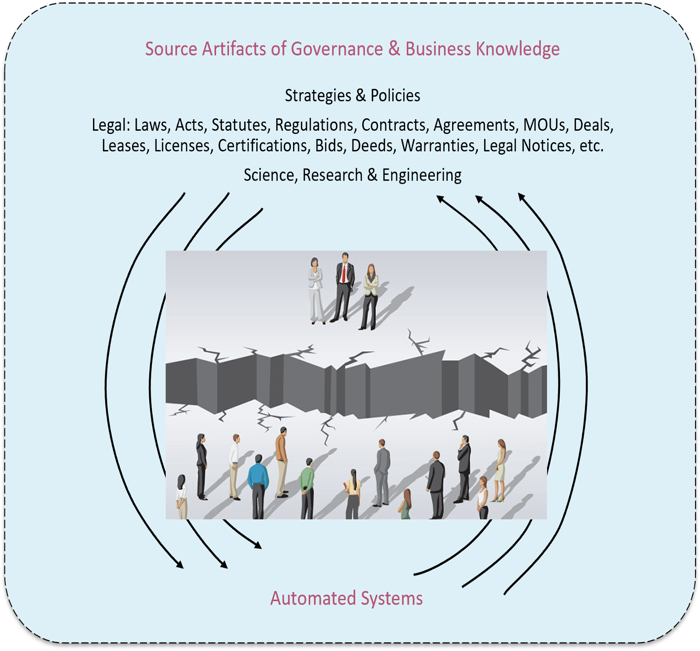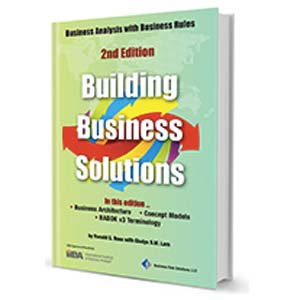The Urgent Need for New Rule Platforms in Business & Government
Extracted from Rules: Shaping Behavior and Knowledge, by Ronald G. Ross, 2023, 274 pp, https://www.brsolutions.com/rules-shaping-behavior-and-knowledge-book.html
The opportunity for rule platforms in the coming years is to get smarter about the fundamental needs of groups and communities of people. These needs include:
- Better governance.
- Digital absorption of laws, regulations, contracts, and agreements.
- Smart touch points that today's digital systems often lack.
- Diminished programmer workload.
Essential in that regard is recognizing that many rules can be violated. It's so obvious. It's a mystery why, two decades into the 21st century, rule platforms don't directly support behavioral rules.[1] Selective responses to violations of behavioral rules allow real-time:
- Insertion of human discretion, sentiment, and common sense into ongoing activities.
- Pinpoint dissemination of needed knowledge.
- Prevention of data defects.
Not catching attempted violations of behavioral rules in real time causes snowballing errors downstream and thus extensive rework. No wonder data quality remains so bad and business software so complex and brittle. That work is currently being left to software developers — and their skills and incentives simply don't align very well with it.
Business and government need platforms such that people (not just software engineers) can work directly with behavioral and definitional rules. The platform should assist people with disambiguation, refinement, verification, implementation, and management of the rules. Work within the platform should be visible and traceable all the way from the initial drafting of policies through to automated application.
Natural Language
A key factor in considering how rule platforms could better support business and government is to remember how guidance is formally communicated. It's expressed in natural language in documents, starting with policies and directives.
On top of that is an array of legal documents, almost all pure text as well, including:

Alongside these are authoritative sources of science and engineering knowledge, documents which are also often extensively framed in text.
Like it or not, policy makers and knowledge workers by and large will never learn a different means to represent, revise, or disambiguate the policies, rules, and other content already expressed in these artifacts. And why should they?!
Yet most rule platforms today don't support any form of natural language. How well do you think a rule platform will fare among policy professionals, business people, and knowledge workers without such support?![2]
Unfortunately, most rule platforms to date have assiduously avoided natural language in any form, as well as its natural cohort, business semantics. They were simply not originally developed to address the problem of organizing and documenting rules for groups and communities of people.
Aside: Most existing rule platforms were originally created to emulate human intelligence (e.g., expert systems) and/or to support architectural separation at runtime between business content that changes frequently and other programming code.
In general, rule platforms have not come to grips with the fact that rules for groups and communities of people are first and foremost a communication problem, not an engineering problem. Also, the industry seems to have a fixation on perfect disambiguation (impossible), rather than on pragmatic disambiguation beyond a reasonable doubt in a well-defined context.[3]
It would be hugely productive to reach a pragmatic middle ground where humans contribute structured business vocabularies based on concept models (business ontologies), and machines exploit those specifications to assist with automated disambiguation of rule statements in some form of controlled natural language. Yes, it's a hard problem — but by no means is it impossible.
In the day and age of statistical AI, a language-based (symbolic) approach for rules might seem out of touch. No! It's not old-fashioned and it's never actually been solved. In any case, surely generative AI with its focus on natural language could be a helpful partner in that regard.
In a day and age when you can Google almost anything, it's amazing in fact that it hasn't already happened. We need to envision a new partnership between humans and machines, one more directly suitable to governance.
Closing the Governance Gap
Lack of support for some form of natural language leaves a huge gap right at the heart of organizations. And it's not just a technological gap, it's also a traceability gap. Why?
Today, automating governance sources requires translation, not just interpretation. Under the very best of circumstances, this translation is into specific parameter settings for some automated tool(s). Far more common is translation into procedural coding languages — a.k.a. programming.
Indeed, the overwhelming majority of rules for business and government is still implemented using procedural software languages not at all built for that purpose. That simply won't do. The resulting gap from a governance perspective is illustrated in Figure 1.

Figure 1. The Governance Gap
What impacts does the gap have for the day-to-day needs and practices of business and government?
- Loss of traceability. Top-down, it's hard to determine what pieces of code implement which policy so as to prove that obligations have been met correctly. Compliance professionals feel this pain acutely (or sometimes are simply too numb to articulate it).
- Diminished agility. Change is far harder than it needs to be. It's not possible simply to re-state and re-interpret the content of source artifacts through to implementation, watching for conflicts, gaps, and inconsistencies — including, of course, inter-artifact clashes. That's hard enough on its own. Instead, change almost always requires programmer intervention.
- Poor corporate memory. In an ever more fluid digital workplace, who can possibly remember that some new bit of code implemented some revised piece of policy in a particular way for a given reason?!
Loss of traceability, however, works both ways. Bottom-up, it's hard to determine real-life motivation for crucial pieces of code so as to understand what results should be considered authentic.
So, impact assessment is difficult and time-consuming in both directions. Nobody enjoys it or feels very productive doing it.
That software work, in turn, is not simply a matter of translating modifications into computer code. First, developers must do fine-grained detective work to determine what code needs to be revised or replaced where, work that is often very time-consuming and error-prone in its own regard. It's not a happy overall mix whatsoever!
Rules for groups and communities of people always pertain to corporate memory. (Perhaps we should call it community memory instead!) In this regard, it is no surprise that the law is so relevant to rules. With regard to everyday business activity, does the following sound familiar?[4]
"One of the important roles of a contract is memory, in at least two different ways: 1. The recollections and expectations of the original parties diverge with time. 2. In business life, the original definers of the deal, and hence of the contract, move on and are replaced by people who do not know the deal except from the written documentation."
Policy and knowledge are never static. Unforeseen events (e.g., pandemics) will happen. Hard-coded, long-forgotten policies and rules embedded in legacy will have knock-on effects as new policies and rules are introduced. The problem is not about speed of software deployment per se; it's about having a governance mechanism to evaluate new circumstances comprehensively and react appropriately.
Creating and deploying policy and rules into day-to-day business operations is at the very heart of business governance. Such creation and deployment should be:

Does the need for such policy-oriented rule platforms seem obvious? Yes, it is! Being rule-based is the most basic characteristic of Western civilization. We need to do it better!
References
[1] For more, refer to Ronald G. Ross, "The Two Fundamental Kinds of Rules,"
Business Rules Journal, Vol. 24, No. 6, (Jun. 2023)
URL: http://www.brcommunity.com/a2023/c120.html
[2] Oracle Intelligent Advisor (formerly Oracle Policy Automation (OPA)) was an early pioneer and exception in this regard.
[3] For more, refer to Ronald G. Ross, "Being Unambiguous Beyond Reasonable Doubt in Expressing Rules," Business Rules Journal, Vol. 25, No. 1, (Jan. 2024)
URL: http://www.brcommunity.com/a2024/c134.html
[4] Contract Drafting to Software Specification: Linguistic Sources of Ambiguity: A Handbook, Version 1.0, November 2003, by Daniel M. Berry, Ph.D., Erik Kamsties, Ph.D., and Michael M. Krieger, Ph.D., J.D., p. 17.
# # #
About our Contributor:
Online Interactive Training Series
In response to a great many requests, Business Rule Solutions now offers at-a-distance learning options. No travel, no backlogs, no hassles. Same great instructors, but with schedules, content and pricing designed to meet the special needs of busy professionals.










How to Define Business Terms in Plain English: A Primer
How to Use DecisionSpeak™ and Question Charts (Q-Charts™)
Decision Tables - A Primer: How to Use TableSpeak™
Tabulation of Lists in RuleSpeak®: A Primer - Using "The Following" Clause
Business Agility Manifesto
Business Rules Manifesto
Business Motivation Model
Decision Vocabulary
[Download]
[Download]
Semantics of Business Vocabulary and Business Rules